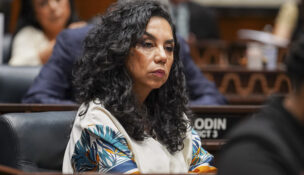Parents turn to rulemaking agency over proposed age caps for disability services
Reagan Priest Arizona Capitol Times//November 26, 2025//
Parents turn to rulemaking agency over proposed age caps for disability services
Reagan Priest Arizona Capitol Times//November 26, 2025//
Key Points:
-
Parents are raising concerns over cuts to the Arizona Long Term Care System
-
The state Medicaid system is proposing age caps for caregiving services
-
Parents took their concerns to the Governor’s Regulatory Review Council on Nov. 25
Parents of children receiving services under the Arizona Long Term Care System are continuing to sound the alarm over potential age caps for Medicaid coverage of services for medically complex children and adults.
During a Nov. 25 meeting of the Governor’s Regulatory Review Council, 12 parents spoke against proposed rule changes for caregiving services for children and adults with developmental disabilities and complex medical needs. The Home and Community Based Services Needs Tool, created by the Arizona Health Care Cost Containment System, will determine state coverage for those services by age.
The age caps stem from a budget shortfall due to the Parents as Paid Caregivers program within the Department of Economic Security’s Division of Developmental Disabilities. A standoff over the future of the program between legislative Republicans and Gov. Katie Hobbs ultimately ended with a mandate for AHCCCS to develop “a strengthened standardized assessment tool to determine the need for extraordinary care for minor children.”
Any cuts to the program, including the proposed age caps, have been widely decried by parents and advocates.
“We’re all here today because we care about families and doing what’s right, but we cannot wait for long-term reforms to fix the crisis that is harming families right now,” Melissa De Leon told GRRC. “Once these policies are finalized the damage becomes significantly harder to undo.”
According to GRRC staff, 118 petitions were submitted to the council after AHCCCS announced policy statements in September imposing age caps for services. Responding to the backlash, Hobbs directed AHCCCS to delay implementation and submit an emergency rulemaking, which the agency did on Oct. 15.
The emergency rulemaking allows the agency to take public comment from affected families, health care providers and other stakeholders into account while expediting the typical rulemaking process, which can sometimes take months or even over a year.
AHCCCS is also developing an exception process to the new rules for children who require “extraordinary care” as part of the emergency rulemaking. Services affected by the emergency rulemaking include in-home care, bathing, eating and feeding, general supervision, and other round-the-clock care needed for individuals who cannot care for themselves.
The Oct. 15 filing of the emergency rulemaking superseded the original policy statements and effectively rendered the petitions to GRRC moot, preventing the council from taking any action on them. The council can only revise, modify, or invalidate policy statements within its statutory authority, but it cannot use any of those options now that the policy statements are no longer being enforced by AHCCCS.
However, GRRC chair Jessica Klein allowed several parents to speak about the emergency rulemaking and the effects the potential cuts will have on their families. Most parents argued that the age caps proposed in the emergency rulemaking are arbitrary or even illegal under federal disability law.
“The age does not determine a disability, it does not determine safety, it does not determine medical necessity, but the needs tool and the (Extraordinary Care Review) process use age as a deciding factor,” said Marissa Martinez, a parent of a disabled child receiving DDD services.
Some suggested assessing eligibility based on the individual’s skills or needs and argued that the state is more focused on reducing the cost of caring for medically or developmentally complex individuals than on ensuring those individuals have adequate care.
Other parents highlighted how the confusing and often convoluted nature of agency rulemaking has made it difficult for them to understand how their children and families will be affected by these changes.
Sara Goldsen told GRRC: “I really want to advocate for families that when all of this jargon and proposal come out, if you guys could include a plain English version — I understand you have to have all of your red tape — but if you could distill it into just basic English and in this state, frankly, basic Spanish, that would help families lessen anxiety and know what’s going on and what’s being proposed.”
Klein emphasized to the parents present at the Nov. 25 meeting that GRRC has little authority to govern how or when AHCCCS conducts its emergency rulemaking, but said council members understood the concerns raised by their comments.
A representative from AHCCCS was also present at the meeting and told parents she would take the comments back to the agency for review and consideration. The public comment period on the emergency rulemaking ended on Nov. 24.
However, AHCCCS will undertake a regular rulemaking to keep the new rules on the books long term, as emergency rules expire after 180 days, and expects to start that process in January.
Ultimately, GRRC is likely to reject the 118 petitions filed over the policy statements, but it will review and provide final approval or denial of the regular rulemaking package when it is complete.














































